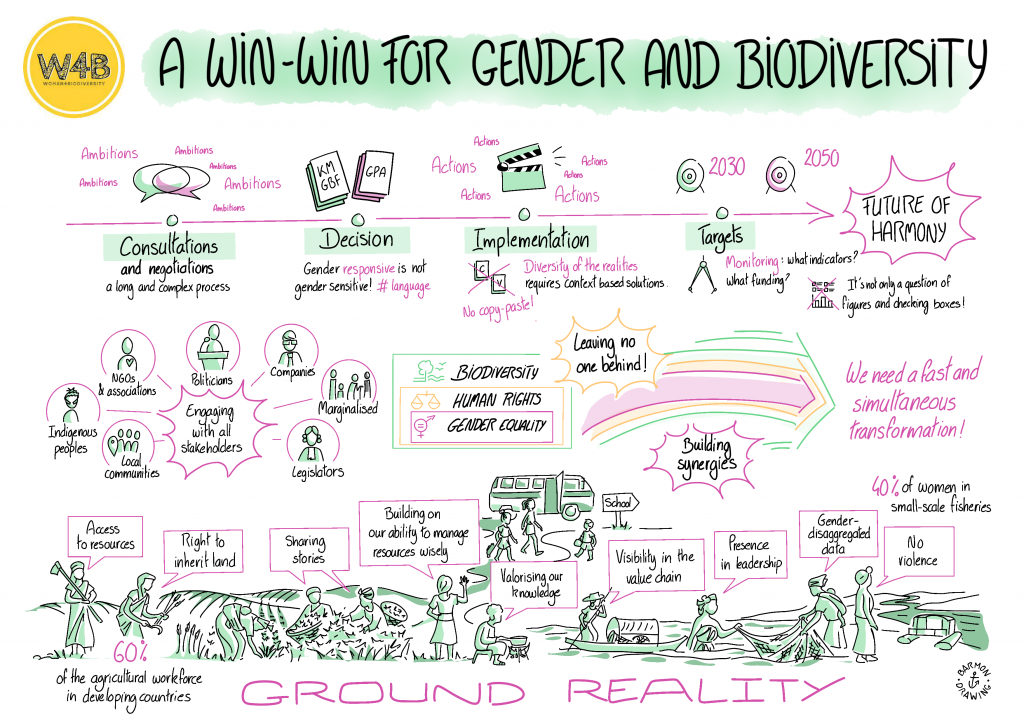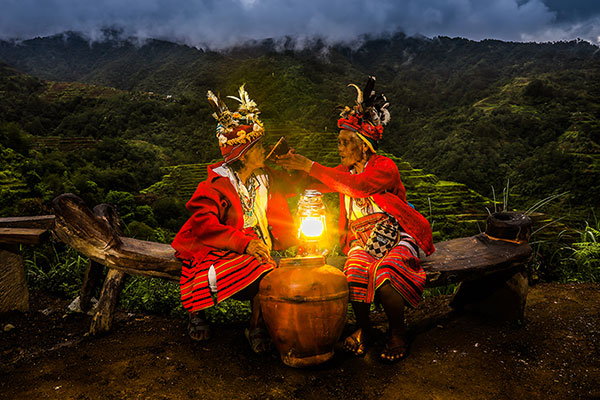WHAT
A 2-hour-long panel discussion on women’s rights and a gender-responsive implementation of the Kunming Montreal Global Biodiversity Framework (KM-GBF). The discussion will prompt participants to rethink humanity’s relationship with nature by exploring the roles of women’s rights, gender equality, and broader human rights in achieving biodiversity goals by 2030.
WHEN
Wednesday, 23 August 2023
13.00 to 15.00 hours
WHERE
CBD room 301, Vancouver Convention Centre, Vancouver, Canada.
Register here for in-person attendance.
WHO
The hosts of this event are Women4Biodiversity, SwedBio and the Secretariat of the Convention on Biological Diversity (SCBD). The co-organisers are The International Union for Conservation of Nature (IUCN), World Wildlife Fund (WWF) International, United Nations Development Programme (UNDP), and the Indigenous Information Network (IIN).
The speaker panel consists of,
- David Cooper, Acting Executive Secretary, SCBD (Opening remarks)
- Olivier Rukundo, Head of the Peoples and Biodiversity Unit, SCBD
- Neil Pratt, Officer in Charge, Implementation Support Division, SCBD
- Lucy Mulenkei, Executive Director, Indigenous Information Network (IIN)
- Amelia Arreguin, UNCBD Women’s Caucus Coordinator
- Samantha Munang’andu, Project Coordinator, Action Aid – Zambia
- Ayshanie Labe, Resident Representative, UNDP Nepal
- Lucia Ruiz Bustos, Conservation Areas Director, WWF US
- Melina Sakiyama, Youth Voices Programme Coordinator, Global Youth Biodiversity Network (GYBN)
- Mrinalini Rai, Director, Women4Biodiversity
- Basile van Havre, Special Advisor, Environment and Climate Change Canada (Closing remarks)

WHY
- Facilitate gender-responsive implementation of the UNCBD KM-GBF and funding support to operationalize the Gender Plan of Action.
- Increase awareness of the linkages between human rights, gender equality and biodiversity and how these could be supported for effective and inclusive implementation of the GBF
- Identify possible gender-sensitive indicators to operationalise the biodiversity framework.
- Explore pathways for a transformative global and national biodiversity agenda through sharing of experiences, knowledge and lived experiences.
Moderators
Mrinalini Rai and Olivier Rukundo
WATCH THE REPLAY
Highlights from the event
Summary
The side event highlighted the pivotal role of a human rights-based approach in environmental policy. It emphasized the historical significance of gender advocates and the need to ensure inclusive participation, intersectional perspectives, and a focus on justice to drive transformative change. The session also recognized the interconnectedness of nature, indigenous communities, and global youth movements as key to creating policies that promote a harmonious relationship with the environment. Even though there are challenges ahead to achieve gender-focused initiatives within biodiversity conservation, the Kunming-Montreal Global Biodiversity Framework is an opportunity to a more comprehensive and inclusive approach.

Women4Biodiversity (W4B), the Secretariat for the Convention on Biological Diversity (SCBD), SwedBio along with other partners successfully hosted the side-event titled, “A Win-Win for Gender and Biodiversity: Transforming Women’s Rights and Gender Equality for Achieving the Goals and Targets of the Coming Montreal Global Biodiversity Framework” on 23 August 2023 at the 7th GEF Assembly.
The event aimed to explore humanity’s relationship with nature while focusing on women’s rights, gender equality, and human rights as essential components in achieving biodiversity goals and Targets by 2030. The context for this panel discussion arose during CBD COP15 that took place on December 2022 where the Convention on Biological Diversity (CBD) adopted a robust post-2020 Gender Plan of Action. Its objective was to promote gender-responsive implementation of biodiversity measures, ensuring women’s equal access to resources, services, and technologies, as well as their active involvement in biodiversity conservation and sustainable use.
The event started with applauding the efforts of various organizations and individuals involved in organizing it including Women4Biodiversity, the Convention on Biological Diversity (CBD), UNCBD Women’s Caucus, World Wildlife Fund (WWF), United Nations Development Programme (UNDP), and the Indigenous Information Network (IIN). Neil Pratt, the Acting Director of the Division of Implementation Support at the CBD Secretariat, expressed gratitude for the event’s organization and highlighted the significance of gender equality and women’s participation in achieving the Kunming-Montreal Global Biodiversity Framework‘s (KM-GBF) goals. He underscored the importance of KM-GBF’s adoption and the renewed Gender Plan of Action in advancing these objectives. The event also recognized Basile van Havre, Special Advisor to the Environment and Climate Change Canada, playing a crucial role in developing and negotiating the KM-GBF. Havre stressed that while negotiations and consultations are essential stages, the implementation of the said negotiations is more important.
Amelia Arreguin, UNCBD Women’s Caucus Coordinator, started the discussion with the importance of having an international rights instrument like the KM-GBF with Target 22 and Target 23, which focuses on gender equality in the context of biodiversity conservation. She re-emphasized that getting gender Targets approved in KM-GBF was only half of the challenge won, the implementation should accurately reflect the ideas of the Targets. Arreguin further highlighted the importance of ensuring that environmental governance is founded on human rights and strives for gender equity. A successful partnership between all stakeholders unfolds when all parties understand the expected objectives and interact effectively within the Framework. Gender and environmental issues are deeply intertwined, and recognizing this connection is essential in negotiations. The experiences, challenges, and contributions of women and girls around the world vary greatly based on their identities, cultures, and contexts. Therefore, gender-responsive implementation cannot be a one-size-fits-all approach. It needs to be adapted to local and regional circumstances. In this light, KM-GBF is critical in the pursuit of gender-responsive environmental governance.
The next speaker, Melina Sakiyama representing the Global Youth Biodiversity Network (GYBN) identified three key elements for driving transformation as per the below,
- Inclusive Participation: To address power imbalances, disparities in access, and injustices and to ensure that more people, especially women with valuable knowledge, are included in decision-making processes.
- Intersectional Perspective: To emphasize the importance of considering various intersecting factors that influence environmental policy, and recognize that multiple dimensions, such as gender, race, and socioeconomic status, must be taken into account to create comprehensive and effective policies.
- Focus on Justice: To achieve justice, both social and environmental, for transformative change. Recognizing the contributions and rights of marginalized groups, including women and indigenous communities, is central to this pursuit.
Sakiyama also recognised the interconnectedness of nature, indigenous communities, and global youth movements being key to creating policies that promote a harmonious relationship with the environment. A shift in mindset and a commitment to gender balance and representation in decision-making can foster a harmonious relationship with nature and holistic environmental management.
Ayshanie Labe from UNDP-Nepal emphasized the intersection between gender and biodiversity and the importance of social inclusion. Labe stated that there are the implementation of the Targets laid in the KM-GBF is not without challenges particularly in terms of mainstreaming gender and ensuring that projects align with social and economic justice principles. However, she acknowledged that the KM-GBF offers an opportunity for synergy between various conventions and treaties related to human rights, gender, biodiversity, resilience, governance, and poverty reduction.
In this regard, it is important to note that Target 23 (on gender equality) is not an isolated Target rather it can contribute to various aspects of conservation and sustainable use, including 30 by 30 goals, restoration efforts, climate change mitigation, agricultural and nutritional policies, wildlife management, and more.
Lucia Ruiz Bustos from World Wildlife Fund (WWF) discussed the importance of addressing gender disparities and inequalities in various sectors, focusing on the fishing industry as an example. Bustos explained that women often play significant roles in value chains but remain invisible and have limited decision-making power in related organizations. Therefore, the need to include women’s activities and contributions in value chains is important to ensure a more balanced and inclusive approach. She further raised four key points as per below,
- The importance of recognizing and supporting women’s effective governance practices and specialized knowledge.
- The need for context-specific solutions and to avoid copying policies from other countries without adaptation.
- Acceleration of generational transitions of power to include more youth in conversations related to gender and biodiversity.
- The need for progress measures and enhanced accountability, particularly the development of indicators that can segregate data by gender.
Bustos concluded by stating that countries should aim to identify various genders beyond just women and men, therefore, recognizing the diversity within society and mainstreaming gender policies even in sectors where binary gender is the norm.
The last speaker, Samantha Munang’andu from Action Aid – Zambia began by sharing how the ground reality for women across different parts of the world is the same. As one of the implementing partners of the Resilient, Inclusive and Sustainable Environments (RISE) Challenge, Samantha talked about the challenges related to gender-based violence and the environment, particularly in the context of fishing communities where men typically own the resources while women are responsible for post-harvest activities. She highlighted the complex dynamics where women are often blamed for engaging in sexual relationships with men to access resources. Samantha emphasized the importance of addressing these issues comprehensively and not merely checking boxes for women’s participation. Samantha further stated that the environmental and human impact must be taken into consideration while implementing a project that focuses on capacity building, and not just quantifying the number of men and women involved. She concluded that gender issues in environmental management often receive less attention than they should, making it challenging to address these issues.
Key takeaways
- The importance of addressing political barriers and ensuring that international policies have a positive impact on society, particularly by not exacerbating burdens on anyone, especially their rights.
- The need to focus on how global targets and goals are perceived and implemented at the national level, emphasizing the importance of adhering to principles of inclusivity, human rights, and social inclusion.
- The recognition that social, cultural, economic, and environmental factors are interconnected and should be considered as a package when addressing gender and biodiversity issues.




I would like to be part of this positive strongly and would like to be receiving news letters
Hi Hassan, thanks for the comment. Kindly go to this link: https://www.women4biodiversity.org/newsletter/ and scroll down to fill in your details. You will then receive our quarterly newsletters! Hope this helps.